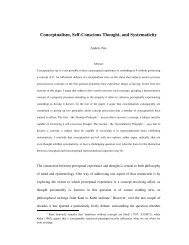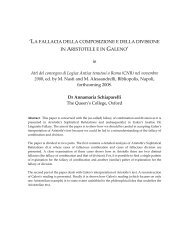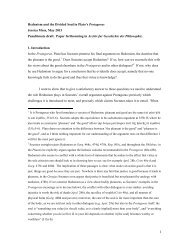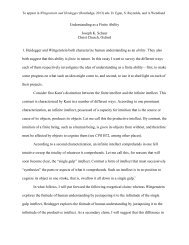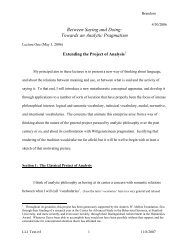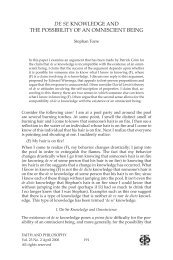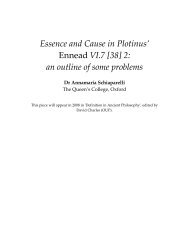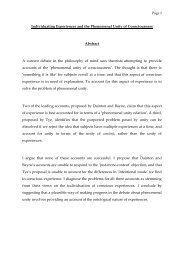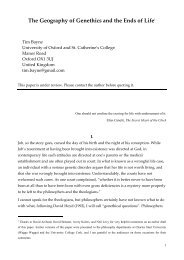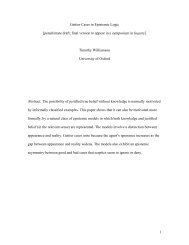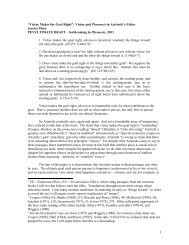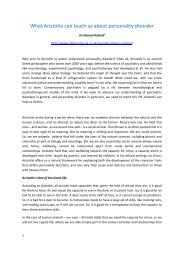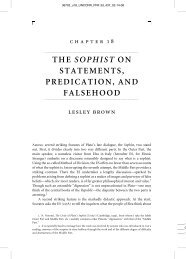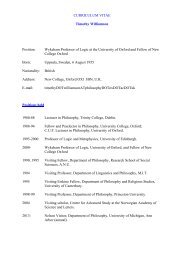Say who everyone is as you go along - Faculty of Philosophy ...
Say who everyone is as you go along - Faculty of Philosophy ...
Say who everyone is as you go along - Faculty of Philosophy ...
You also want an ePaper? Increase the reach of your titles
YUMPU automatically turns print PDFs into web optimized ePapers that Google loves.
46<br />
true ? Nietzsche h<strong>as</strong> no answer to th<strong>is</strong> question. Nietzsche's position <strong>is</strong> incons<strong>is</strong>tent<br />
with the weaker kind <strong>of</strong> mind-body dual<strong>is</strong>m on which there are mental events that are<br />
not physical, but no soul. Soul <strong>is</strong> only the name <strong>of</strong> something in the body means that<br />
mentality <strong>is</strong> only a physical property <strong>of</strong> the body. Thinking, for example, <strong>is</strong> only a<br />
neurological process in the brain.<br />
Although part <strong>of</strong> Nietzsche's strategy <strong>is</strong> to debunk spirituality <strong>as</strong> metaphysical<br />
illusion, by reducing the spiritual and mental to the physical, h<strong>is</strong> considered position<br />
<strong>is</strong> not material<strong>is</strong>t. He thinks that a human being <strong>is</strong> their life (or lives) and <strong>as</strong>pects <strong>of</strong><br />
the life process may be thought <strong>of</strong> <strong>as</strong> mental, or physical, or neither. Nietzsche uses<br />
material<strong>is</strong>m <strong>as</strong> a philosophical weapon against mind-body dual<strong>is</strong>m, the<strong>is</strong>m, and other<br />
metaphysical theories but once it h<strong>as</strong> been used he <strong>is</strong> happy to relinqu<strong>is</strong>h it. A similar<br />
pragmatic emph<strong>as</strong><strong>is</strong> on the physical world, and denigration <strong>of</strong> metaphysical<br />
spirituality, can be found in Buddh<strong>is</strong>m. In The Diamond Sutra, which recounts the<br />
former lives <strong>of</strong> the Buddha, Siddhartha Gotama himself says<br />
'when my body w<strong>as</strong> cut to pieces by the king <strong>of</strong> Kalinga, I had neither the idea <strong>of</strong> an<br />
e<strong>go</strong>, nor the idea <strong>of</strong> a person, nor the idea <strong>of</strong> a being, nor the idea <strong>of</strong> a soul' (ZNM<br />
120/MZB 51)<br />
Read one way, the Buddha <strong>is</strong> saying that in facing death he w<strong>as</strong> facing the<br />
destruction <strong>of</strong> h<strong>is</strong> body not the destruction <strong>of</strong> something mental or immaterial. In h<strong>is</strong><br />
previous incarnations the Buddha w<strong>as</strong> not yet an enlightened being and so feared<br />
death. Presented with d<strong>is</strong>memberment by the king <strong>of</strong> Kalinga, what he feared in<br />
fearing h<strong>is</strong> own destruction w<strong>as</strong> the destruction <strong>of</strong> h<strong>is</strong> body. The destruction <strong>of</strong> h<strong>is</strong><br />
body <strong>is</strong> necessary and sufficient for h<strong>is</strong> own destruction. Th<strong>is</strong> view <strong>is</strong> b<strong>as</strong>ed on the<br />
pragmatics <strong>of</strong> ordinary fear, not on metaphysical belief or a priori argument. Like<br />
Nietzsche, the Buddha <strong>is</strong> presenting the identification <strong>of</strong> oneself with one's body <strong>as</strong><br />
the real<strong>is</strong>tic view, the view one adopts in living practice rather than when doing<br />
metaphysics or theology. Not only were the ide<strong>as</strong> <strong>of</strong> e<strong>go</strong>, person, being, and soul not<br />
sufficient to d<strong>is</strong>pel the immediate fear <strong>of</strong> death through d<strong>is</strong>memberment, these<br />
philosophical concepts were not even present to h<strong>is</strong> mind. Read another way, the<br />
Buddha <strong>is</strong> saying that in h<strong>is</strong> experience <strong>of</strong> dying he did not encounter e<strong>go</strong>, person,<br />
being, or soul. These concepts do not denote anything in the transition from life to<br />
death. In describing what it <strong>is</strong> to die, we should not have recourse to them because<br />
dying <strong>is</strong> the destruction <strong>of</strong> the body. On both interpretations, death <strong>is</strong> a test <strong>of</strong><br />
metaphysics. In fearing death, our fear <strong>is</strong> for our body. In dying, it <strong>is</strong> the body that<br />
dies. Practically, I am not my e<strong>go</strong>. Practically, I am my body. Nietzsche says:<br />
'An instrument <strong>of</strong> the body <strong>is</strong> also thy little sagacity, my brother, which thou callest<br />
"spirit"' (Z 36)<br />
and



